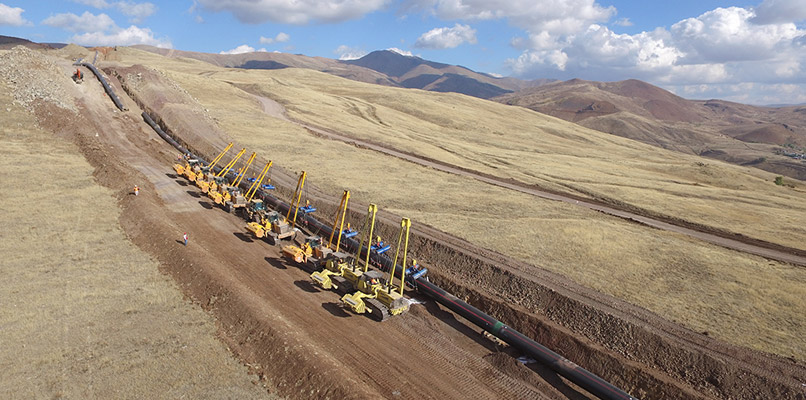New Gas Pipeline Could Heat up Azeri-Russian Rivalry
MOSCOW (Reuters) — Azerbaijan's ties with Russia, already strained by conflict in Nagorno-Karabakh, face further pressure from the launch later this year of a gas pipeline that is poised to squeeze Moscow's diminished gas sales to Europe and Turkey.
The $40 billion Southern Gas Corridor will draw from Azerbaijan's giant Shah Deniz II field in the Caspian Sea and has the backing of the European Commission as it seeks to curb Europe's dependence on Russian energy.
It also has the support of Turkey, which has sided with Baku in the deadliest fighting since the 1990s between Azerbaijan and ethnic Armenian forces in the Nagorno-Karabakh region.
The fighting has spread to Azeri cities close to the Southern Gas Corridor, but BP in Azerbaijan, part of a consortium of companies involved in the project, told Reuters it was going ahead as planned.
"As of now, all our business operations in the region continue as normal and our plans remain unchanged," a BP spokeswoman said.
At the same time, Russian ambitions to expand its pipeline capacity to Europe risk being thwarted by U.S. sanctions.
Analysts say Moscow has good relations with Armenia and Azerbaijan and a pragmatic relationship with Turkey that has overcome past crises and differing stances on Syria.
Competition for gas sales, however, is particularly unwelcome as Russia's economy suffers because of the impact on oil and gas demand of the COVID-19 pandemic.
Over the last week, Russian President Vladimir Putin has spoken repeatedly to the Armenian prime minister, but not to the leaders of Azerbaijan or Turkey.
Economic Strain
Russia's central bank said gas exports by value fell to $11.44 billion in the first half of this year from $18.65 billion in the corresponding period of 2019.
The country's pipeline gas exporting monopoly Gazprom plans to ship at least 170 bcm of gas to Europe this year, down from 199 bcm in 2019.
In the first half, natural gas exports from Gazprom to Europe, including Turkey, fell 18% to 78.94 bcm. To Turkey alone, they declined by more than 40%, to 4.7 bcm.
Azerbaijan, meanwhile, has pumped almost 7 bcm to Turkey over the last two years via the existing TANAP pipeline, part of the Southern Gas Corridor.
From the fully completed Southern Corridor, expected to become operational in the last part of this year, Turkey will receive 6 bcm of Azeri gas per year, while 10 bcm is earmarked for Europe.
Dmitry Marinchenko, an analyst with Fitch, said the Azeri gas was unlikely to replace all of Gazprom's sales to Europe but poses a significant threat.
"However, with other factors, most of all an increase in liquefied natural gas imports, the start of gas supplies from Azerbaijan leads to heating up of the rivalry," he said.
Gazprom did not respond to a request for comment.
Related News
Related News

- Keystone Oil Pipeline Resumes Operations After Temporary Shutdown
- Biden Administration Buys Oil for Emergency Reserve Above Target Price
- Freeport LNG Plant Runs Near Zero Consumption for Fifth Day
- Enbridge to Invest $500 Million in Pipeline Assets, Including Expansion of 850-Mile Gray Oak Pipeline
- Williams Delays Louisiana Pipeline Project Amid Dispute with Competitor Energy Transfer
- Evacuation Technologies to Reduce Methane Releases During Pigging
- Editor’s Notebook: Nord Stream’s $20 Billion Question
- Enbridge Receives Approval to Begin Service on Louisiana Venice Gas Pipeline Project
- Russian LNG Unfazed By U.S. Sanctions
- Biden Administration Buys Oil for Emergency Reserve Above Target Price





Comments